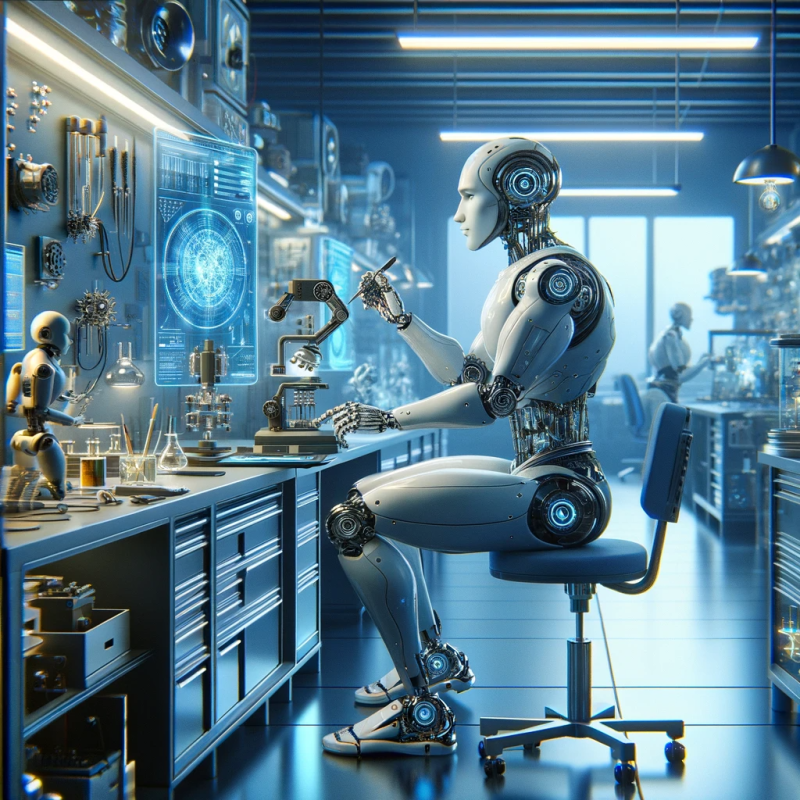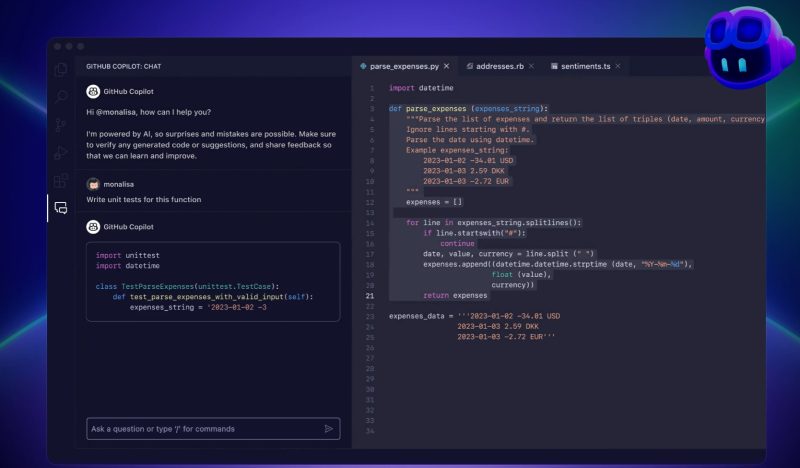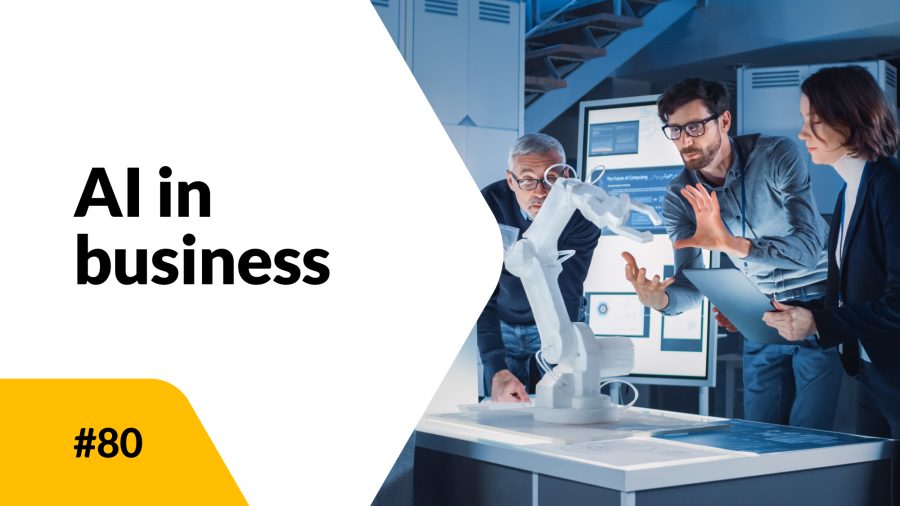Artificial intelligence is changing the world in astonishing ways, and this is just the beginning of its evolution. Explore how new technologies, large language models, and machine learning drive innovations—from programming tools to advanced systems for testing and diagnosing technical issues. Read on to learn more.
The birth of new technologies - table of contents:
How can artificial intelligence contribute to the creation of new technologies?
Artificial intelligence is not only a fascinating new technology but also a powerful tool for creating innovative technological solutions. How can AI contribute to this?
- Generating new ideas and concepts. AI helps to invent entirely new technologies and prototypes of devices. Artificial intelligence can combine facts and concepts in an unconventional way, finding solutions that may elude the human mind.
- Testing and improving prototypes. Thanks to computer simulations, it is possible to quickly and inexpensively test the functionality of a prototype, without wasting time and money on building physical models. AI also allows modeling various usage scenarios and optimizing the project for specific goals.
- Supporting the production process. Intelligent systems can analyze production data in real-time, detect abnormalities, and suggest modifications to processes, ensuring higher efficiency, lower failure rates, and better quality control.
- Improving technology management. AI facilitates monitoring of technological systems, diagnosing and solving problems without human intervention. This saves time and resources, and the new technology operates more efficiently.

Source: DALL·E 3, prompt: Marta M. Kania (https://www.linkedin.com/in/martamatyldakania/)
AI programming: GitHub Copilot
One of the most interesting examples of using AI to assist programmers is GitHub Copilot (https://github.com/features/copilot). It is a tool based on advanced language models that “codes collaboratively” with humans.
However, how does GitHub Copilot work? Copilot analyzes the code written by the programmer and uses it as a reference. This allows it to suggest what should be found in the next lines of the program. It is capable of:
- suggesting expressions and even entire functions,
- generating code for algorithms based solely on the description,
- creating documentation based on the code itself,
- explaining code,
- proposing corrections,
- engaging in complex discussions with the programmer,
- and much more, all in dozens of popular programming languages.

Source: Github (https://github.com/features/copilot)
All a developer has to do is start writing a code snippet, and GitHub Copilot will suggest a complete proposal, based on the analysis of millions of public repositories and a deep understanding of the semantics of programming languages.
The main benefits for programmers include:
- speeding up work by up to 55%,
- increased productivity and satisfaction thanks to quickly emerging, effective solutions,
- less frustration when creating repetitive code,
- faster problem-solving.
Cloud new technologies: innovations from Microsoft
Microsoft has developed innovative applications of natural language models to address a common challenge for many cloud-using companies – issues related to managing such complex infrastructure and responding quickly to failures.
How was this achieved? Microsoft specialists utilized the capabilities of language models to analyze incident descriptions and logs. Based on this, the models can suggest the most likely causes of problems and optimal solutions.
Importantly, the more data fed into artificial intelligence, the more accurate it becomes at detecting and classifying new faults, resulting in faster response times and reduced losses due to cloud disruptions.
Using AI in automatic cloud incident management presents an opportunity for:
- faster diagnosis of the causes of failures – AI analyzes data faster than a human,
- automated repairs – artificial intelligence-generated solutions eliminate the need for human intervention
- less downtime and better operational continuity – faster response reduces losses for companies using new cloud technologies.
This is just the beginning of using AI in new cloud computing technologies. Soon, perhaps, the majority of administrative processes and technical support may be automated.
Siemens: testing software with AI
Siemens specialists have utilized machine learning capabilities to automate a very time-consuming aspect of software development – testing.
They developed a system of new technologies that, based on data from previous tests and code versions, can predict the results of new tests with 78% accuracy.
What does this give in practice? The most important aspect is faster feedback for developers. Developers receive preliminary suggestions regarding test results almost instantly, without waiting for the actual completion of tests, which in large projects can take hours or days.
This allows for faster identification and elimination of errors, without wasting time on context switching and recalling details of previously written code.
The second significant aspect is the optimization of the test order. Predictions regarding their results allow for determining the optimal sequence for running individual tests to encounter potential errors as quickly as possible.
This saves computational resources needed to perform a full set of tests. In studies, even a 10% reduction in the total testing time was observed.

Summary: new AI technologies
Artificial intelligence drives technological progress in many ways. It primarily:
- generates new ideas and device concepts by combining facts in unconventional ways,
- facilitates rapid and cost-effective prototyping, as well as expedites the solution testing process,
- optimizes design and production processes,
- automates the monitoring and maintenance of systems,
- speeds up the work of programmers,
- assists in diagnosing technical problems, and
- automates software testing.
Perhaps soon, the majority of groundbreaking inventions will emerge with the support of artificial intelligence. Therefore, it’s worth keeping abreast of these fascinating changes and continuously learning to leverage new technologies in your work.
If you like our content, join our busy bees community on Facebook, Twitter, LinkedIn, Instagram, YouTube, Pinterest, TikTok.
Author: Robert Whitney
JavaScript expert and instructor who coaches IT departments. His main goal is to up-level team productivity by teaching others how to effectively cooperate while coding.
AI in business:
- Threats and opportunities of AI in business (part 1)
- Threats and opportunities of AI in business (part 2)
- AI applications in business - overview
- AI-assisted text chatbots
- Business NLP today and tomorrow
- The role of AI in business decision-making
- Scheduling social media posts. How can AI help?
- Automated social media posts
- New services and products operating with AI
- What are the weaknesses of my business idea? A brainstorming session with ChatGPT
- Using ChatGPT in business
- Synthetic actors. Top 3 AI video generators
- 3 useful AI graphic design tools. Generative AI in business
- 3 awesome AI writers you must try out today
- Exploring the power of AI in music creation
- Navigating new business opportunities with ChatGPT-4
- AI tools for the manager
- 6 awesome ChatGTP plugins that will make your life easier
- 3 grafików AI. Generatywna sztuczna inteligencja dla biznesu
- What is the future of AI according to McKinsey Global Institute?
- Artificial intelligence in business - Introduction
- What is NLP, or natural language processing in business
- Automatic document processing
- Google Translate vs DeepL. 5 applications of machine translation for business
- The operation and business applications of voicebots
- Virtual assistant technology, or how to talk to AI?
- What is Business Intelligence?
- Will artificial intelligence replace business analysts?
- How can artificial intelligence help with BPM?
- AI and social media – what do they say about us?
- Artificial intelligence in content management
- Creative AI of today and tomorrow
- Multimodal AI and its applications in business
- New interactions. How is AI changing the way we operate devices?
- RPA and APIs in a digital company
- The future job market and upcoming professions
- AI in EdTech. 3 examples of companies that used the potential of artificial intelligence
- Artificial intelligence and the environment. 3 AI solutions to help you build a sustainable business
- AI content detectors. Are they worth it?
- ChatGPT vs Bard vs Bing. Which AI chatbot is leading the race?
- Is chatbot AI a competitor to Google search?
- Effective ChatGPT Prompts for HR and Recruitment
- Prompt engineering. What does a prompt engineer do?
- AI Mockup generator. Top 4 tools
- AI and what else? Top technology trends for business in 2024
- AI and business ethics. Why you should invest in ethical solutions
- Meta AI. What should you know about Facebook and Instagram's AI-supported features?
- AI regulation. What do you need to know as an entrepreneur?
- 5 new uses of AI in business
- AI products and projects - how are they different from others?
- AI-assisted process automation. Where to start?
- How do you match an AI solution to a business problem?
- AI as an expert on your team
- AI team vs. division of roles
- How to choose a career field in AI?
- Is it always worth it to add artificial intelligence to the product development process?
- AI in HR: How recruitment automation affects HR and team development
- 6 most interesting AI tools in 2023
- 6 biggest business mishaps caused by AI
- What is the company's AI maturity analysis?
- AI for B2B personalization
- ChatGPT use cases. 18 examples of how to improve your business with ChatGPT in 2024
- Microlearning. A quick way to get new skills
- The most interesting AI implementations in companies in 2024
- What do artificial intelligence specialists do?
- What challenges does the AI project bring?
- Top 8 AI tools for business in 2024
- AI in CRM. What does AI change in CRM tools?
- The UE AI Act. How does Europe regulate the use of artificial intelligence
- Sora. How will realistic videos from OpenAI change business?
- Top 7 AI website builders
- No-code tools and AI innovations
- How much does using AI increase the productivity of your team?
- How to use ChatGTP for market research?
- How to broaden the reach of your AI marketing campaign?
- "We are all developers". How can citizen developers help your company?
- AI in transportation and logistics
- What business pain points can AI fix?
- Artificial intelligence in the media
- AI in banking and finance. Stripe, Monzo, and Grab
- AI in the travel industry
- How AI is fostering the birth of new technologies
- The revolution of AI in social media
- AI in e-commerce. Overview of global leaders
- Top 4 AI image creation tools
- Top 5 AI tools for data analysis
- AI strategy in your company - how to build it?
- Best AI courses – 6 awesome recommendations
- Optimizing social media listening with AI tools
- IoT + AI, or how to reduce energy costs in a company
- AI in logistics. 5 best tools
- GPT Store – an overview of the most interesting GPTs for business
- LLM, GPT, RAG... What do AI acronyms mean?
- AI robots – the future or present of business?
- What is the cost of implementing AI in a company?
- How can AI help in a freelancer’s career?
- Automating work and increasing productivity. A guide to AI for freelancers
- AI for startups – best tools
- Building a website with AI
- OpenAI, Midjourney, Anthropic, Hugging Face. Who is who in the world of AI?
- Eleven Labs and what else? The most promising AI startups
- Synthetic data and its importance for the development of your business
- Top AI search engines. Where to look for AI tools?
- Video AI. The latest AI video generators
- AI for managers. How AI can make your job easier
- What’s new in Google Gemini? Everything you need to know
- AI in Poland. Companies, meetings, and conferences
- AI calendar. How to optimize your time in a company?
- AI and the future of work. How to prepare your business for change?
- AI voice cloning for business. How to create personalized voice messages with AI?
- Fact-checking and AI hallucinations
- AI in recruitment – developing recruitment materials step-by-step
- Midjourney v6. Innovations in AI image generation
- AI in SMEs. How can SMEs compete with giants using AI?
- How is AI changing influencer marketing?
- Is AI really a threat to developers? Devin and Microsoft AutoDev
- AI chatbots for e-commerce. Case studies
- Best AI chatbots for ecommerce. Platforms
- How to stay on top of what's going on in the AI world?
- Taming AI. How to take the first steps to apply AI in your business?
- Perplexity, Bing Copilot, or You.com? Comparing AI search engines
- ReALM. A groundbreaking language model from Apple?
- AI experts in Poland
- Google Genie — a generative AI model that creates fully interactive worlds from images
- Automation or augmentation? Two approaches to AI in a company
- LLMOps, or how to effectively manage language models in an organization
- AI video generation. New horizons in video content production for businesses
- Best AI transcription tools. How to transform long recordings into concise summaries?
- Sentiment analysis with AI. How does it help drive change in business?
- The role of AI in content moderation


















